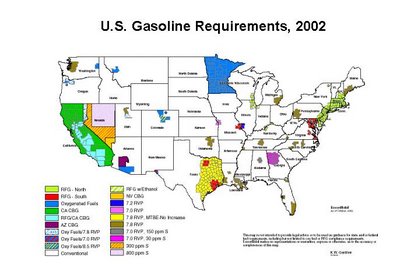However, during my research I happened upon an interesting little chart that highlights the common refrain, "well, if there weren't so many rules and regulations about detergents, additives, etc. on gas, then (fill in state here)___________ wouldn't have such high gas prices."

Not a perfect correlation, but it does seem the Left and East Coasts bring it upon themselves. And if memory serves me correctly, wasn't it California and New York that not only experienced rolling black outs this recent spat of a heat wave this year, but suffered a severe black out a couple years back AND an energy crisis under Gray Davis?
Yeah, NIMBY all the way!
It is nimby - and ethanol is not a solution either. It consumes too much energy in production. It is a net waste of resources, made feasible through government intervention in the form of subsidy and forced purchase.
ReplyDeleteActually, based on the market price of oil, which drives up the market price of ethanol, ethanol producers (or at least the one I'm looking at) are profitable without the subsidy.
ReplyDeleteThat being said, it's a question of whether oil will remain high.
Furthermore, contrary to what most people think, it is the substitution of ethanol for MTBE (an additive) that is driving the majority of demand right now. Not for ethanol to be a substitute for gas.
An interesting note is that without crippling our food supply, we can only produce about 14 billion gallons of ethanol a year in the US. Nowhere near enough to replace gasoline.
It is a nice little pipe dream.
The cost comparison should use untaxed gasoline vs. ethanol with no subsidy.
ReplyDeleteI suppose every little bit helps... but if we try to significantly replace gasoline with ethanol, the price of the grains will rise and food costs will rise.
Use of other biomass would help, and sugar is more efficient but sugar prices are already artificially high due to gov. interventions.